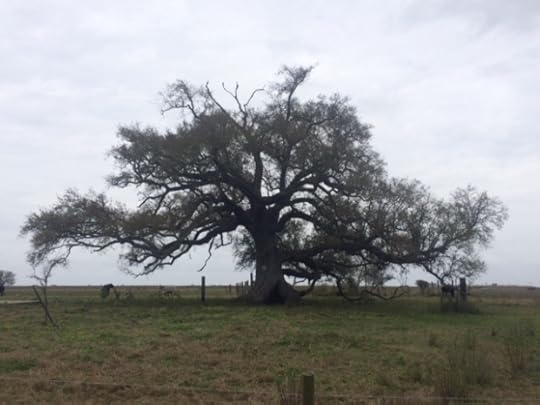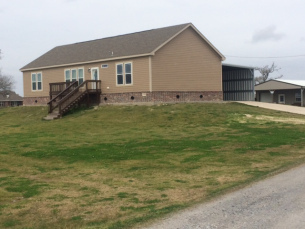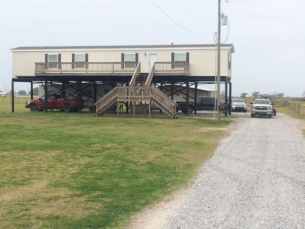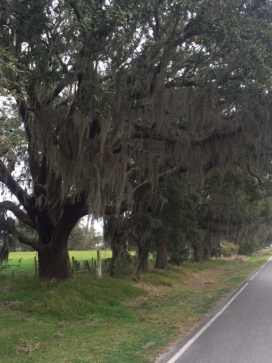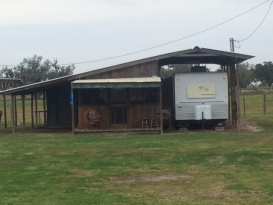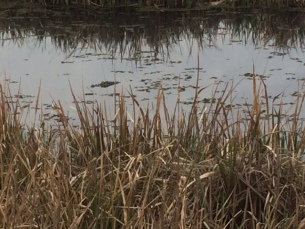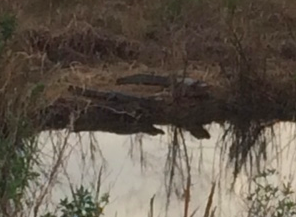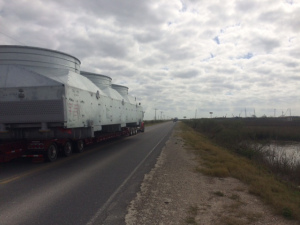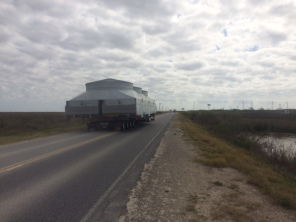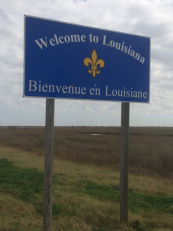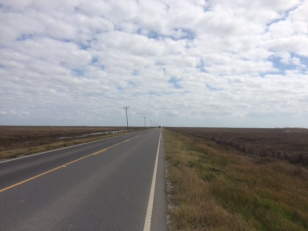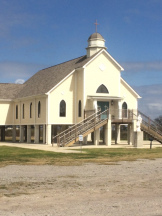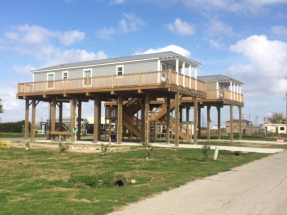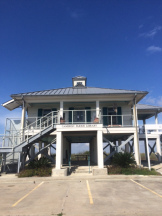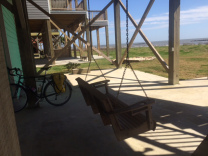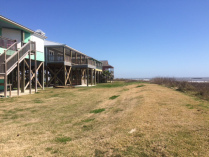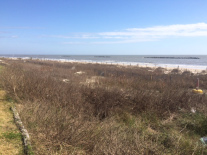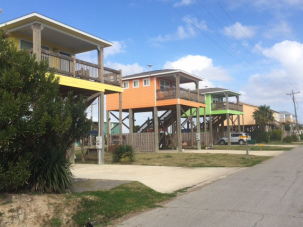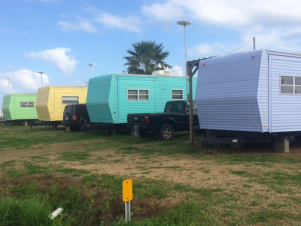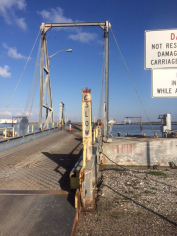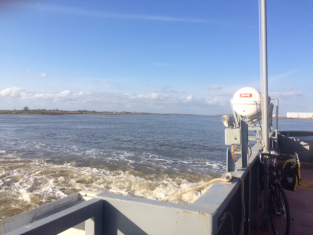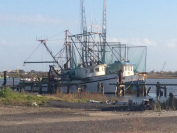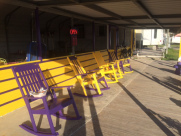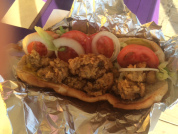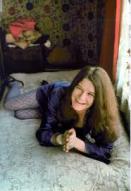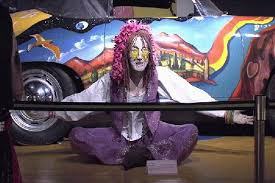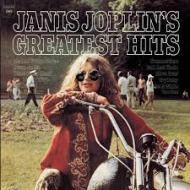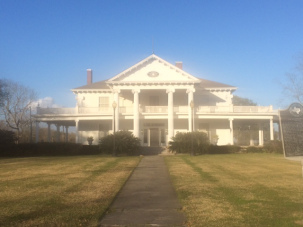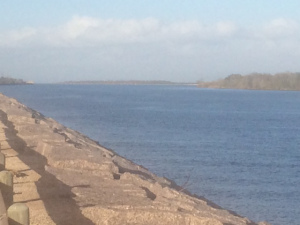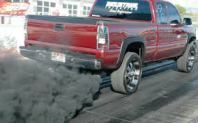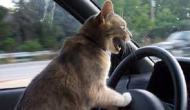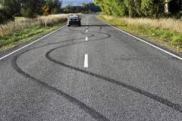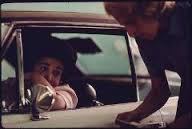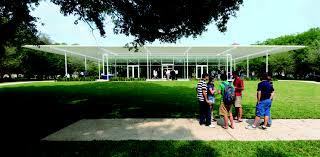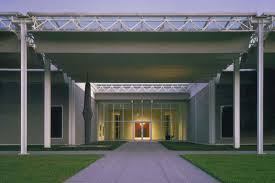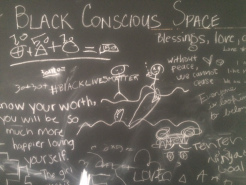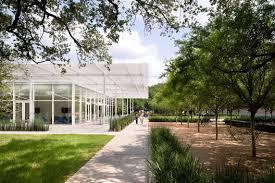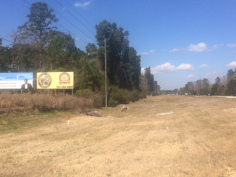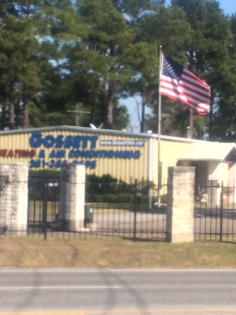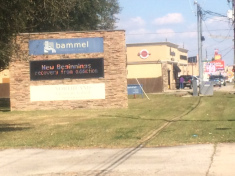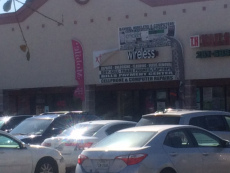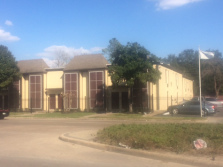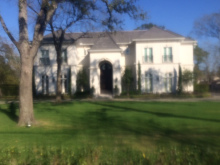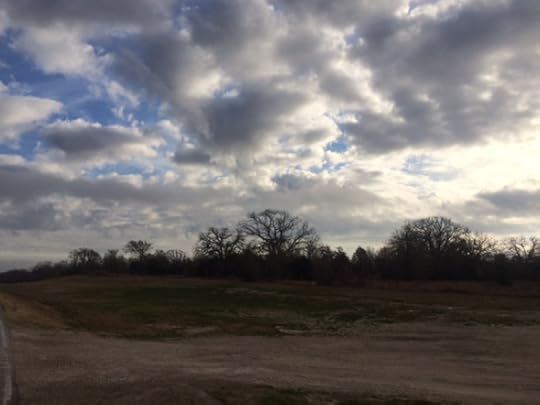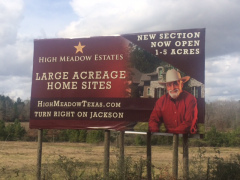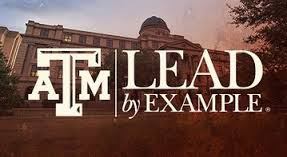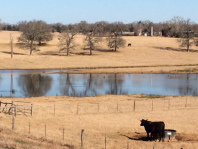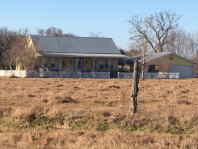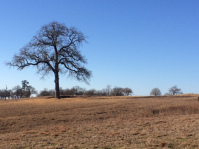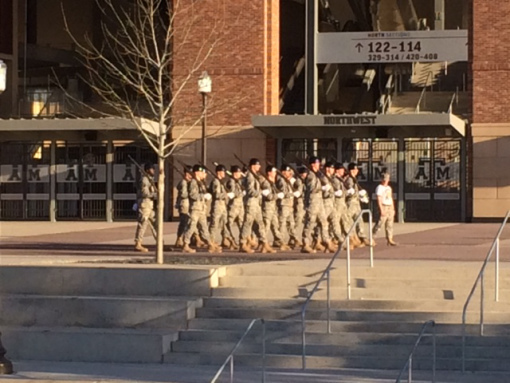Paul E. Fallon's Blog, page 53
February 23, 2016
Trip Log – Day 238 – Cameron, LA to Pecan Island, LA
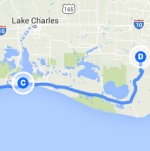 February 21, 2016 – Clouds, 70 degrees
February 21, 2016 – Clouds, 70 degrees
Miles Today: 60
Miles to Date: 12,122
States to Date: 29
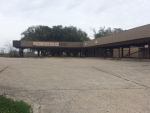 Solid clouds, smooth roads, a withering breeze, scant traffic, and friendly fishermen made for a great day of riding. The only things more than ten years old (pre-Hurricane Rita) were mighty Oaks, low-lying gravestones, even closer to the ground alligators, and the hulking remains of structures that nobody’s bothered to either repair or destroy.
Solid clouds, smooth roads, a withering breeze, scant traffic, and friendly fishermen made for a great day of riding. The only things more than ten years old (pre-Hurricane Rita) were mighty Oaks, low-lying gravestones, even closer to the ground alligators, and the hulking remains of structures that nobody’s bothered to either repair or destroy.
Query of the day: why did some people choose to build back on mounds of dirt while most built back on stilts? Building on piers ought to be less expensive; depending on how far one has to drill the supports. Houses on stilts are taller and the storms pass right through them. Then again, the storm takes the all-important four-wheel toys that people collect beneath their raised homes. If your earthen mound is large enough, your vehicles stay dry as your children.
Thirty miles in, the trees started collecting moss. I get deeper into the South ever day.
Elaborate containers, complete with shade cover and screened porches, often swallow up trailers.
I’ve spotted many elegant birds on my trip; eagles, condors and hawks. Today I saw many blue heron and snowy egret. I have been less lucky with wildlife, but locals in Cameron assured me I’d see alligators along Highway 82. I didn’t see any for miles, but when I heard a kersplash as I rolled by, I looped back and stood silent on the road. Sure enough, the eyes of an alligator popped out of the calm water. He fit right into the floating moss, though it drifted faster than he did. Within minutes I spotted a second one in the same pond.
Like so many things, once you know what you’re looking for, things are easy to see. Over the next five miles I spotted fifteen alligators, most on the far shore of the ponds that line the south side of the highway, many in pairs, some over six feet long.
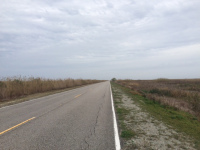 As I approached the eastern edge of Cameron Parish all signs of civilization disappeared except the blacktop: no houses, no driveways, no electric wires. For more than five miles into Vermillion Parish the road was man’s sole intervention. Then, slowly, bits of human evidence reappeared until I came to the linear village of Pecan Island and found my warmshowers host for the night.
As I approached the eastern edge of Cameron Parish all signs of civilization disappeared except the blacktop: no houses, no driveways, no electric wires. For more than five miles into Vermillion Parish the road was man’s sole intervention. Then, slowly, bits of human evidence reappeared until I came to the linear village of Pecan Island and found my warmshowers host for the night.
 Juanita and her herd of farm animals greeted me with a hug and a cold beer. She served crab boil and jambalaya, which went down smooth, but unfortunately exited my intestines just as just as quickly. Everything in my life just passes through.
Juanita and her herd of farm animals greeted me with a hug and a cold beer. She served crab boil and jambalaya, which went down smooth, but unfortunately exited my intestines just as just as quickly. Everything in my life just passes through.


February 22, 2016
Trip Log – Day 237 – Port Arthur, TX to Cameron, LA
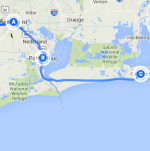 February 20, 2016 – Sun, 75 degrees
February 20, 2016 – Sun, 75 degrees
Miles Today: 56
Miles to Date: 12,062
States to Date: 29
For the next month my biggest climbs are going to be over shipping channels. I downshifted over two tall bridges today as I started rolling along the Gulf of Mexico, which I will do all the way to Naples, Florida.
The day began with big clouds, air sweet and thick enough to top a pie. I backtracked through the urban desert of downtown Port Arthur, climbed my first bridge to Paradise Island, and went west, then south, and finally east past the industry along the shipping channel.
A caravan of six gigantic cooling tower manifolds with police escorts and flashing lights passed me. I passed them back when they stopped to change officials at the state line, and so they passed me again.
Another bridge across the Sabine: Welcome to Louisiana! The pavement was smooth, the land flat and saturated with water. The clouds began to evaporate.
Unlike Texas, every kind of building is elevated here.
After 35 miles I took a stub road to the beach. The houses on stilts were mostly boarded up, so I made myself comfortable on a porch swing and took a nice break in refreshing breeze and cool shade.
In Holly Beach the stilts grew even taller. Shotgun houses stacked on high. Curiously, there were also many trailers. They seemed so fragile compared to the buildings. I suppose they just get carted away when storms hit the shore.
Route 82 in Louisiana has so little traffic they didn’t bother building a bridge over the Calcasieu Channel. A small ferry crosses back and forth every fifteen minutes 24/7. It gave me a chance to stretch my legs and chat with locals.
Cameron is an oil and fishing patch, large enough to have a food stand open past 3 p.m. so I was able to savor my first Oyster Po’boy, which I ordered ‘All the Way’, meaning mayo and mustard, tomatoes, lettuce and onions. Mighty good. I want more.
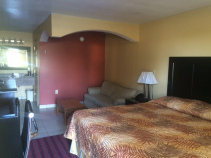 The Cameron Motel is the only sleeping spot in town, with only one customer on this Saturday night. Don’t try to find it on hotels.com. I thought eighty bucks was steep until I saw the room: classic Patel sheik with a mirrored ceiling above the sofa area. Any motel with a first floor room Surly can roll into, chipped ice, in-room coffee, and reliable Wi-Fi has everything I need. Heck, in this stretch of swamp, having a motel at all is worth that price.
The Cameron Motel is the only sleeping spot in town, with only one customer on this Saturday night. Don’t try to find it on hotels.com. I thought eighty bucks was steep until I saw the room: classic Patel sheik with a mirrored ceiling above the sofa area. Any motel with a first floor room Surly can roll into, chipped ice, in-room coffee, and reliable Wi-Fi has everything I need. Heck, in this stretch of swamp, having a motel at all is worth that price.


February 21, 2016
Trip Log – Day 236 – Beaumont, TX to Port Arthur, TX
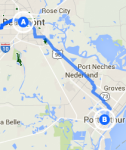 February 19, 2016 – Sun, 75 degrees
February 19, 2016 – Sun, 75 degrees
Miles Today: 38
Miles to Date: 12,006
States to Date: 28
Although I have yet to cross the Louisiana state line, today was my first day in the South. Everything moved a bit slower, everybody was a bit more friendly, I got called ‘Sir’ more times than I prefer, and I shook lots of hands. The landscape is lush, the grand homes are symmetrical, the new homes squat on the ground. Downtowns are deserted, the far side of the tracks is very poor, and franchise chicken is ubiquitous. I saw as many signs for soul food and Cajun food as Mexican food and barbeque. People in this remote corner of Texas speak with a drawl.
I spent last night with an energetic young ExxonMobil engineer, this morning with the Republican candidate for the 136th District Court Judge position, and the afternoon with the freethinking Education Coordinator for the Museum of the Gulf Coast, where I also got to wallow in Janis Joplin memorabilia. ‘Me and Bobby McGee’ is one of my favorite songs to sing on the shoulder.
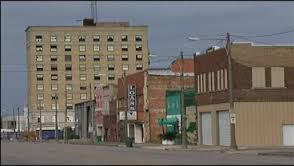 In between I pedaled strong headwinds and climbed the levy that protects the City of Port Arthur, despite the fact that everybody left downtown years ago.
In between I pedaled strong headwinds and climbed the levy that protects the City of Port Arthur, despite the fact that everybody left downtown years ago.


February 20, 2016
Trip Log – Day 235 – Houston, TX to Beaumont, TX
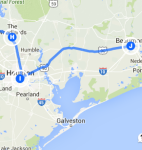 February 18, 2016 – Sun, 70 degrees
February 18, 2016 – Sun, 70 degrees
Miles Today: 86
Miles to Date: 11,968
States to Date: 28
Closing in on 12,000 miles and spanning the breadth of Texas makes me an expert of sorts on one ornery aspect of distance cycling: heckling. Heckling is rare. Based on the counting and extrapolation my mind wanders to on long travel days, I figure over a quarter of a million cars have passed me so far. More have hassled me in Texas than all other states combined, but they still only number a few dozen. Yet hecklers loom large in my memory. Here are the seven forms of heckling I’ve endured so far, in order from what I consider most disgusting to almost delightful.
The Ashtray. Getting flicked with ashes from a passing pick-up passenger is the worst heckle I’ve suffered so far. It stings.
The Exhaust Cloud. I first got this in Yosemite National Park. A truck passes me, slows down, shifts into the shoulder, and then guns their engine, rocketing a plume of smoke in my face.
The scold. This heckle is the unique province of female drivers who are more interested in shaping behavior than displaying dominance. They slow their mini-vans down and yell at me, “get on the sidewalk.” Legally, cyclists are supposed to be on the road. In Houston a Hispanic woman chastised me to a sidewalk, even though there was none.
The honk. This is the most common heckle. It can be two beeps or a long, drawn out honk. Though some drivers may mean it as encouragement, it is still annoying. When I am riding lawfully I never acknowledge a horn, even when accompanied by a friendly wave. I don’t want to encourage it.
The swerve and skid. A hot shot slides into the shoulder in front of me and peels away. This is the most benign testosterone surge. Without an exhaust plume it’s neither dangerous nor uncomfortable. It’s easy to laugh away.
The spritz. I’ve only been squirted with water once. It was a warm afternoon and felt pretty good.
The joke. This heckle is actually fun. Two guys came upon me in Grant’s Pass OR. They shouted “nice ass”. Unfortunately for them, the light before us turned red, which allowed me to catch up. “Glad you like my butt.” I grinned at their odd taste in men. “We like to shout to cyclists but always say something nice. I explained that, “Telling a sixty-year-old man he’s got a nice butt is much more than nice.”


February 19, 2016
Trip Log – Day 234 – Houston, TX
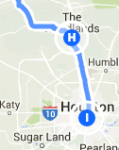 February 17, 2016 – Sun, 80 degrees
February 17, 2016 – Sun, 80 degrees
Miles Today: 31
Miles to Date: 11,882
States to Date: 28
What is art? What are our responsibilities to this planet and to each other? Are those two questions connected? This is what percolated through my mind as I navigated this robust, rich, impoverished, generous, selfish, confusing, amiable city.
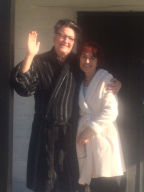 I lingered with Lisa and Preston over pastries topped with fresh fruit and pecan cappuccino on their back porch because the morning was fine and their company sweet. I savor my opportunities to be with nurturing couples. Night work, living without a car in a city of freeways, and a porch overlooking concrete can’t diminish their affection. Preston reiterated a phrase I’ve heard from others who’ve found the right partner: “I’m the luckiest guy in the world.”
I lingered with Lisa and Preston over pastries topped with fresh fruit and pecan cappuccino on their back porch because the morning was fine and their company sweet. I savor my opportunities to be with nurturing couples. Night work, living without a car in a city of freeways, and a porch overlooking concrete can’t diminish their affection. Preston reiterated a phrase I’ve heard from others who’ve found the right partner: “I’m the luckiest guy in the world.”
Google map is way ahead of Houston. The city is in the process of connecting the bikeways along the bayous, but Google kept directing me on routes that don’t quite exist. As a result I ran a bit late all day.
Picah Mivan was waiting for me when I arrived back at Rice and The Pavilion. I was delighted to meet this graduate student who contacted me after reading my 1981 thesis, Architecture that Affords Play. I am astonished how our digital world promotes dissemination beyond all expectation. Micah and I sat on the grass rather than inside the glass box. “I like the form of The Pavilion, but I don’t like how it reinforces status. It’s a place to be seen eating overpriced food. It’s where the administration takes donors to ask for money.”
After a delicious lunch at the Montrose HEB, I visited the Menil Collection. Renzo Piano’s building is superb, the main collection is jaw dropping, the juxtaposition of contemporary and African art is insightful. Beyond Menil’s signature building is a campus of new and reused buildings, all painted the same muted taupe. Dan Flavin’s installation in a former grocery store begs the question, is this big space with an array of colored lights, artificially heated and cooled, employing a jovial guard who counts the people who stop by, an appropriate use of a building that once contributed to the community in a more fundamental way? It is less than it was, yet more than it would be if the Menil had not repurposed it.
I looked forward to visiting the Rothko Chapel; Rothko is my favorite artist. I wasn’t disappointed so much as being there at the wrong time in the wrong frame of mind. Mid-afternoon, the chapel is over bright, full of school groups and other tourists. There’s nothing contemplative about it beyond meditating on the reality that we humans have become incapable of quiet for even five minutes.
 The chapel is one of Rothko’s last works, very somber, very dark. He killed himself not long after its completion. I realized that my connection with Rothko’s early work is stronger. Perhaps our younger selves possessed complementary perspectives. Rothko grew more depressed with age, while I have done the opposite. His late work does not resonate with me.
The chapel is one of Rothko’s last works, very somber, very dark. He killed himself not long after its completion. I realized that my connection with Rothko’s early work is stronger. Perhaps our younger selves possessed complementary perspectives. Rothko grew more depressed with age, while I have done the opposite. His late work does not resonate with me.
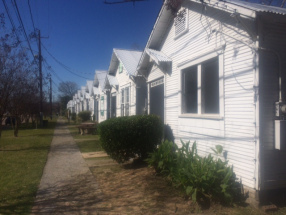 I pedaled away from the Menil with a hollow in my gut. There was something incongruous about the cerebral art scattered among bungalows. My senses were fully satisfied at Project Rowhouse, on the other side of the tracks. Rick Low purchased a block of shotgun houses in Houston’s Third Ward and turned each into a small gallery. He orchestrates two themed shows a year. Round 43 is now on display: Small Business/Big Change, Economic Perspectives from Artists and Artrepreneurs. The show includes five installations about the Black economic experiences and two pop-up stores, one with locally made soaps and herbs, the other baked treats by Ella Russell. The art at Project Rowhouse is not as refined; some is not that good. But what is good is very fresh. It was difficult for me to understand why Cy Twombly’s scribbles merit an entire building at the Menil while a comparable blackboard about Black experience will simply be erased when ‘Small Business/Big Change’ ends later this month.
I pedaled away from the Menil with a hollow in my gut. There was something incongruous about the cerebral art scattered among bungalows. My senses were fully satisfied at Project Rowhouse, on the other side of the tracks. Rick Low purchased a block of shotgun houses in Houston’s Third Ward and turned each into a small gallery. He orchestrates two themed shows a year. Round 43 is now on display: Small Business/Big Change, Economic Perspectives from Artists and Artrepreneurs. The show includes five installations about the Black economic experiences and two pop-up stores, one with locally made soaps and herbs, the other baked treats by Ella Russell. The art at Project Rowhouse is not as refined; some is not that good. But what is good is very fresh. It was difficult for me to understand why Cy Twombly’s scribbles merit an entire building at the Menil while a comparable blackboard about Black experience will simply be erased when ‘Small Business/Big Change’ ends later this month.
The contradictions of my day continued. A fascinating conversation with Megan Parks on her decision to leave BP after fifteen years due to the chasm between personal and corporate beliefs preceded an evening with Mike Finley, an independent oil and gas entrepreneur in his duplex loft overlooking the city who advocates fewer constraints on energy exploration and extraction.
For a guy on a bike, some days I really get around.


February 18, 2016
Trip Log – Day 233 – Houston, TX
 February 16, 2016 – Sun, 80 degrees
February 16, 2016 – Sun, 80 degrees
Miles Today: 16
Miles to Date: 11,852
States to Date: 28
I rose with the sun and pedaled to the campus of Rice University, which ranks as one of the most attractive campuses of my trip. Boston architect Ralph Adams Cram came to Houston to design the campus over a hundred years ago. He developed an axial plan and eclectic Mediterranean style for the buildings such in polychrome and fantasy. He also lined the walks with live oaks which, although apparently not native to this area, have become signature landscape features.
The campus continued to develop along strict lines except for one sad addition, a 1940’s library that bisects the quad. Fortunately, Rice built two superb structures in the early 2000’s to mitigate the mess. Near the backside of the unfortunate library they built The Pavilion, a crisp white and glass space for hanging out. The simple form creates an airy indoor area, covered outdoor spaces, and extensive gardens. Though small in footprint, it manages to mask the library. At the far end of the long space Rice terminated the quad with a respectable School of Music Building, in the traditional Rice style, and then set James Terrill’s Skyspace in front of it, an echo the Pavilion’s taut whiteness. The two modernist elements are the exclamation points that make the entire ensemble coherent.
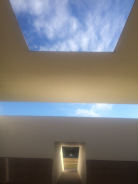 I enjoyed a trio of fascinating conversations. Ron Sass, Fellow for Climate Change at the Baker Institute and Rice Professor Emeritus met me at The Pavilion to talk about energy from the global to the molecular. I pedaled over to City Hall to meet Lisa Lin, Houston’s Sustainability Manager. Finally I walked across the plaza to the imposing One Shell Place to talk with Lyman Paden, attorney and partner at Baker Bott as well as an old high school friend who’s savvy to the comings and goings of his adopted hometown.
I enjoyed a trio of fascinating conversations. Ron Sass, Fellow for Climate Change at the Baker Institute and Rice Professor Emeritus met me at The Pavilion to talk about energy from the global to the molecular. I pedaled over to City Hall to meet Lisa Lin, Houston’s Sustainability Manager. Finally I walked across the plaza to the imposing One Shell Place to talk with Lyman Paden, attorney and partner at Baker Bott as well as an old high school friend who’s savvy to the comings and goings of his adopted hometown.
Then I cycled to the other side of town and stayed with a bartender and his girlfriend who prefer their unpretentious Mexican neighborhood to Houston’s hipster precincts.


February 17, 2016
Trip Log – Day 232 – The Woodlands, TX to Houston, TX
 February 15, 2016 – Sun, 70 degrees
February 15, 2016 – Sun, 70 degrees
Miles Today: 44
Miles to Date: 11,836
States to Date: 28
Riding through the exurbs of any American city is the least enjoyable part of my journey. Pedaling forty-four miles into Houston, the fifth largest metropolitan area, fastest growing among the top twenty, and notoriously ill willed toward cyclists, was simply a chore.
In order to gauge my progress across this featureless landscape littered with attention grabbing signage, I decided to stop at every five-mile interval and photograph whatever I saw at that point; a game we played in graduate school photography class. Can you find patterns in this urban cacophony?
Five miles
Ten miles
Fifteen miles
Twenty miles
Twenty-five miles
Thirty miles
Thirty-five miles
Forty miles


February 16, 2016
Trip Log – Day 231 – College Station TX to The Woodlands, TX
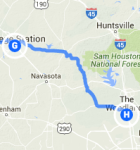 February 14, 2016 – Cloudy, 70 degrees
February 14, 2016 – Cloudy, 70 degrees
Miles Today: 75
Miles to Date: 11,792
States to Date: 28
My cycling Sunday began with a carb fest at my motel: oatmeal, raisin bran, sweet buns, and a machine that poops out pancakes. I definitely prefer the flip waffle maker, but I gave the pancakes a try. That breakfast fueled me over fifty miles through low-lying swamp,; cattle, goat and Brahmin ranches, rolling hills, and East Texas forests beneath dramatic clouds.
 About fifty miles north of Houston I came up against exurban development. The prices of custom built home advertisements illustrated that this is pretty high rent part of the metropolis. But I still found plenty of down home Texas. I took a break among a group of guys with loud, revved muscle cars, mostly Mustangs. They drag raced down a Farm-to-Market road. I was surprised they were spinning cars along public pavement on a Sunday afternoon, though I appreciated that they picked a length of super smooth blacktop. I imagine their fun ended soon after I passed, as the Sheriff I saw heading their way after I left was zooming their way mighty fast.
About fifty miles north of Houston I came up against exurban development. The prices of custom built home advertisements illustrated that this is pretty high rent part of the metropolis. But I still found plenty of down home Texas. I took a break among a group of guys with loud, revved muscle cars, mostly Mustangs. They drag raced down a Farm-to-Market road. I was surprised they were spinning cars along public pavement on a Sunday afternoon, though I appreciated that they picked a length of super smooth blacktop. I imagine their fun ended soon after I passed, as the Sheriff I saw heading their way after I left was zooming their way mighty fast.
I approached The Woodlands in time for a writing break, where I encountered my first open carry cowboy in Texas. His piece was rather modest, but a McDonald’s doesn’t require the same firepower as a saloon.
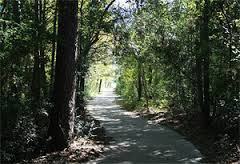 The Woodlands is a 1970’s era planned community that emphasizes the natural environment to the point of confusion. It’s also huge. For almost ten miles, scrub pines dominate every winding road and serpentine bike path. Commercial signs are tiny, houses and apartments are hidden. I got where I needed to be by luck more than compass. Everything in this parcel of former swamp looks pretty much the same
The Woodlands is a 1970’s era planned community that emphasizes the natural environment to the point of confusion. It’s also huge. For almost ten miles, scrub pines dominate every winding road and serpentine bike path. Commercial signs are tiny, houses and apartments are hidden. I got where I needed to be by luck more than compass. Everything in this parcel of former swamp looks pretty much the same


February 15, 2016
Trip Log – Day 230 – College Station TX
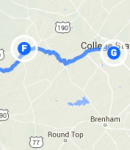 February 13, 2016 – Cloudy, 65 degrees
February 13, 2016 – Cloudy, 65 degrees
Miles Today: 16
Miles to Date: 11,717
States to Date: 28
To understand the pivotal relationship that College Station TX has played in my life requires suspension of rational thought and action. Are you game?
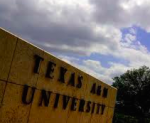 Before I was born, before my parents were married, before my father fought in World War II, Mickey Fallon was a fresh recruit, a wannabe gunner. The army sent him to College Station for a few weeks training. He was enthralled by Aggieland.
Before I was born, before my parents were married, before my father fought in World War II, Mickey Fallon was a fresh recruit, a wannabe gunner. The army sent him to College Station for a few weeks training. He was enthralled by Aggieland.
My father went on 52 bombing missions over Germany, returned to his construction roots rather than get a GI Bill education, married a beautiful though incompatible woman, and banged out a bunch of kids. I am number four.
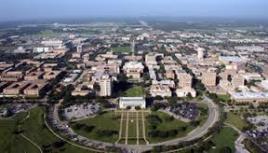 Through my youth, my seat at our kitchen table in Toms River, New Jersey, was crammed against the wall beneath a gigantic map of the United States. A thumbtack marked College Station, Texas. The taller I grew, the closer I got to Texas A&M.
Through my youth, my seat at our kitchen table in Toms River, New Jersey, was crammed against the wall beneath a gigantic map of the United States. A thumbtack marked College Station, Texas. The taller I grew, the closer I got to Texas A&M.
My father, despite his own disinterest in college, wanted all of his sons to be Aggies. My oldest brother was accepted and joined the Corps of Cadets. Number Two didn’t have the grades, but my dad arranged for him to go to a Texas junior college that might serve as a feeder. By the time my sister went to a state school in nearby Nacogdoches, there were more Fallon kids in Texas then not. Dad put the pressure on mom to make the move to the Lone Star State. He almost s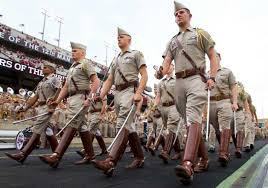 ucceeded. Mom agreed to leave New Jersey but refused to suffer the Texas heat. So, my parents negotiated a latitudinal meeting point along the 100th meridian, which is how they wound up moving my little brother and me to Norman, Oklahoma in 1973. If you find logic in this process, welcome to my family.
ucceeded. Mom agreed to leave New Jersey but refused to suffer the Texas heat. So, my parents negotiated a latitudinal meeting point along the 100th meridian, which is how they wound up moving my little brother and me to Norman, Oklahoma in 1973. If you find logic in this process, welcome to my family.
My oldest brother dropped out of the Corps, and then out of A&M completely. My next brother never completed junior college. My sister escaped Texas by marrying her high school sweetheart. Still married 45 years later, she made a good choice.
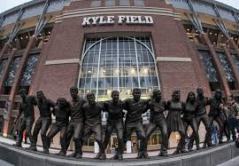 My father never found his stride in Oklahoma. His business faltered. My mother went to work. She gained confidence. His dream dwindled. I never even applied to Texas A&M. Instead I returned back East, among the elites my father disdained.
My father never found his stride in Oklahoma. His business faltered. My mother went to work. She gained confidence. His dream dwindled. I never even applied to Texas A&M. Instead I returned back East, among the elites my father disdained.
Eventfully my parents divorced. Dad returned to New Jersey and married a young woman who made him very happy. Meanwhile all the other people he displaced stayed in Oklahoma or migrated further West.
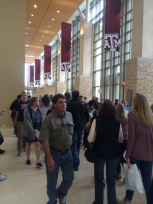 Today was Aggieland Day at Texas A&M. I spent the morning in Memorial Union surrounded by eager high school students exploring this spirited place. It was easy to see what my father wanted for us. Texas A&M is a place of individual excellence and collective strength; bursting with pride of purpose.
Today was Aggieland Day at Texas A&M. I spent the morning in Memorial Union surrounded by eager high school students exploring this spirited place. It was easy to see what my father wanted for us. Texas A&M is a place of individual excellence and collective strength; bursting with pride of purpose.
One could discount my father’s dream as a failure; none of his sons are Aggies. But that sprawling map on the wall of my childhood kitchen was my first introduction to the breadth of this amazing country. It triggered the idea that the United States could, and should, be explored. So here I am, seventy-five years after my father came to College Station, enthralled by the Aggies.


February 14, 2016
Trip Log – Day 229 – Rockdale, TX to College Station TX
 February 12, 2016 – Sunny, 80 degrees
February 12, 2016 – Sunny, 80 degrees
Miles Today: 57
Miles to Date: 11,701
States to Date: 28
I am deep in the heart of Texas. The land pulses with Lone Star pride, rolling with richness and strength. I pedaled twenty-five miles to Caldwell along picturesque FM 908, stopped for a delicious lunch at a Czech bakery, and continued on to College Station.
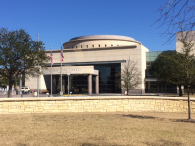 I arrived at Texas A&M in time to visit the George Bush Presidential Library, number four along my presidential library route. I had been warned that the Bush library was a snoozer, and it is. There was little drama in George Bush’s life and there is none in his library. Why it is located at Texas A&M is a mystery – the man had no formal ties to this place. But he was hell bent on denying his East Coast roots. The opening line of the orientation film is, “There is a misconception that we were from the East Coast.” It’s an odd denial for a man born in Massachusetts, educated at Andover and Yale, whose father was a Senator from Connecticut. But if Presidential Libraries are about anything, they are about shaping a message for posterity. In the United States, we are unhindered by being ‘from’ the place we are born. We choose where we are from. Fixing his legacy in marble at Texas A&M is a logical extension of George Bush’s choice to be from Texas.
I arrived at Texas A&M in time to visit the George Bush Presidential Library, number four along my presidential library route. I had been warned that the Bush library was a snoozer, and it is. There was little drama in George Bush’s life and there is none in his library. Why it is located at Texas A&M is a mystery – the man had no formal ties to this place. But he was hell bent on denying his East Coast roots. The opening line of the orientation film is, “There is a misconception that we were from the East Coast.” It’s an odd denial for a man born in Massachusetts, educated at Andover and Yale, whose father was a Senator from Connecticut. But if Presidential Libraries are about anything, they are about shaping a message for posterity. In the United States, we are unhindered by being ‘from’ the place we are born. We choose where we are from. Fixing his legacy in marble at Texas A&M is a logical extension of George Bush’s choice to be from Texas.
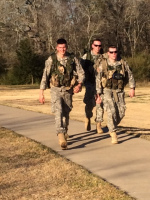 Texas A&M is a sprawling campus renowned for its Corps of Cadets, the original 12th man. Although the Corps is a minority of the student body, its presence permeates the place. On a Friday afternoon, I witnessed cadets running rucksack, marching in front of Kyle Stadium, and drilling on the Quad. The Memorial Union proclaims, ‘Loyalty’, ‘Integrity’, ‘Respect’ over each entrance. The Corps owns this place.
Texas A&M is a sprawling campus renowned for its Corps of Cadets, the original 12th man. Although the Corps is a minority of the student body, its presence permeates the place. On a Friday afternoon, I witnessed cadets running rucksack, marching in front of Kyle Stadium, and drilling on the Quad. The Memorial Union proclaims, ‘Loyalty’, ‘Integrity’, ‘Respect’ over each entrance. The Corps owns this place.



